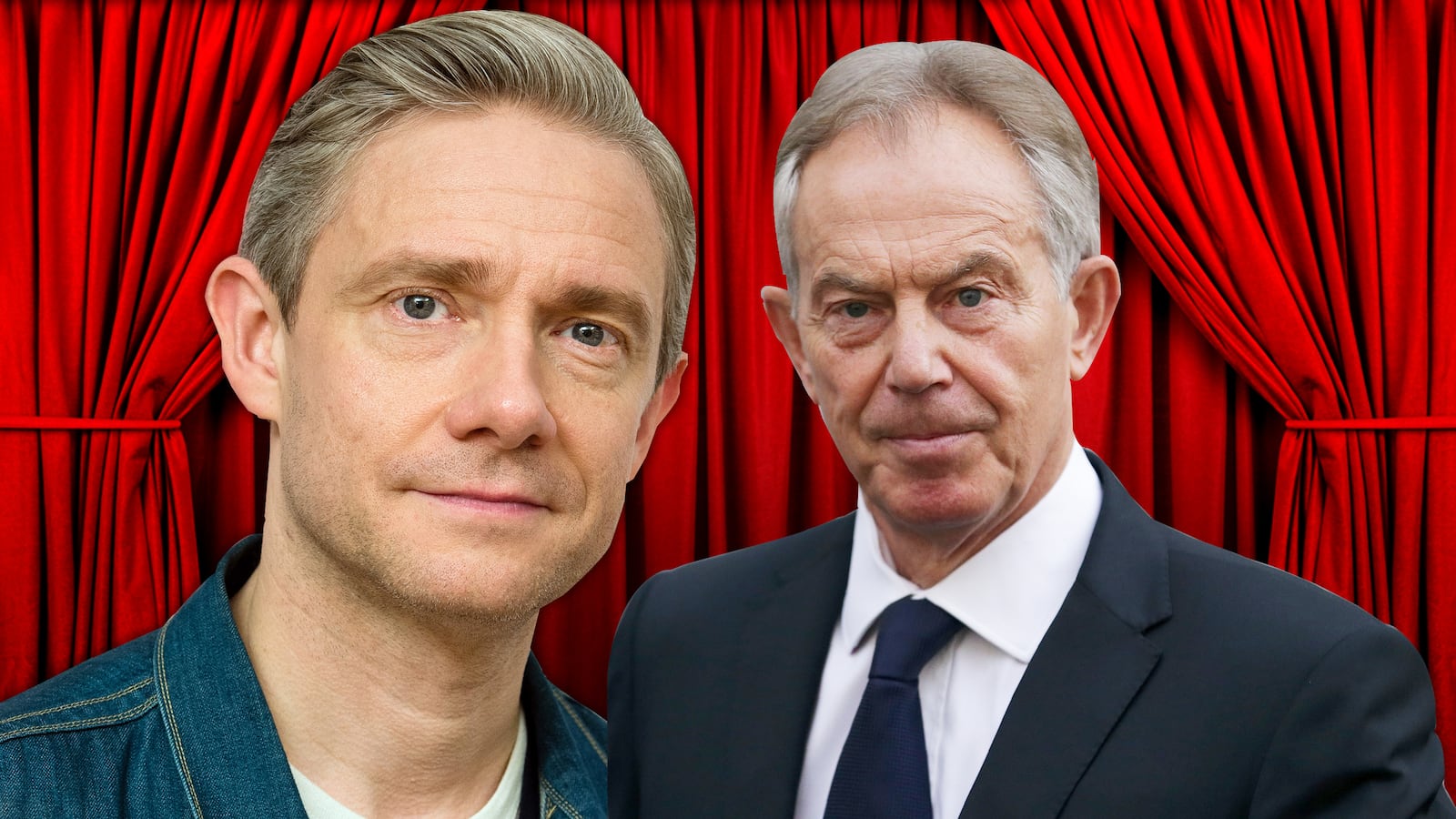LONDON—It was Dr. Watson who finally pronounced the political death of Tony Blair.
Martin Freeman, the sidekick to Benedict Cumberbatch’s Sherlock Holmes, was on stage or the first preview for a raucous new play about life in the Labour Party when he heralded the end of an era. Labour of Love, a comedy-drama by James Graham—London’s hottest young playwright—focuses on the fight for the soul of the party.
In a remarkable moment of choreography—Jeremy Corbyn had triumphantly addressed the party’s annual conference just a few hours earlier.
Corbyn’s speech was a watershed moment. After months of brutal debate within the party, Corbyn has consolidated his unlikely position as leader and silenced his moderate challengers after outstripping expectations at this year’s general election, even though Theresa May and the Conservatives still limped back into Downing Street. During his victory lap at a swaggering party conference in Brighton, he declared that his radical left-wing version of the party was here to stay.
Back in the West End, Freeman—who plays a Labour member of Parliament (MP) for the North Midlands—observes: “Everyone’s acting like we’ve won when we lost. Talk about hubristic.”
There were knowing titters from the audience—some of whom had just got off the train from Brighton.
As a moderate MP who looks an awful lot like Tony Blair, with a grasping wife who looks a lot like Cherie, Freeman’s character David Lyons is actively engaged in the ideological battle to modernize and moderate the Labour Party after the wilderness years of radicalism in the 1980s.
The play jumps back and forth across the decades as Freeman rises and falls within the party, battling against the more radical forces of the grassroots. Without giving away the rollicking twists and turns of the romantic and political plotlines, the arch modernizer—who comes to personify Blair’s centrist zeal—finally admits that the battle for the party has been lost. “You’re the future now,” he admits to one of his more left-wing comrades, with a sigh that is simultaneously exasperated and relieved. “Make the most of it.”
The moderates have been vanquished; if this ardent Blairite admits it, Tony Blair’s enduring political influence must finally be over.
It’s quite a coup for James Graham to have landed a star of Freeman’s caliber (The Hobbit, Fargo, The Office) for the latest of his critically acclaimed political dramas. Previews of the show opened just a few doors down from his hit play Ink, which transferred to the West End this month after rave reviews at The Almeida. That coruscating show tells the controversial true story of Rupert Murdoch’s acquisition and transformation of The Sun newspaper.
In Graham’s trademark style, a relentless stream of jokes punctuates what is otherwise an in-depth examination of a serious subject. While Ink and his breakthrough show This House—about the chaotic British politics of the 1970s—were told through characters based on real people and real events, Graham has given himself more license with Labour of Love. He uses well-judged TV news montages to root the story in the recent past, but planting a fictional MP and his wife into the middle of this picture allows him to enjoy a few more theatrical flourishes.
Yes, Cherie Blair—a high-powered lawyer—really did find it difficult to get on with some of more traditional Labour politicians, but here we are treated to a kind of political Cruella de Vil.
When Lyons is parachuted into the safe Labour seat in the Midlands, his wife is deeply unimpressed with the locale. Lyons tries to convince her that they will settle in and eventually come to be local residents. “We’re not tourists,” he tells her.
“Of course not,” she shoots back. “The last tourists here were the bloody Normans.”
While shrugging off his wife’s indifference, Lyons keeps up the battle within the party, which resembles the Democrats’ Bernie-Hillary fallout but has been raging for more than a century. “You win from the center always,” is his mantra.
Lyons’ hero Blair pops up repeatedly. One of the clips is from his first party conference as Labour leader in Blackpool in 1994. “Today politics is moving to our ground,” he says. “We are the mainstream voice in politics.”
A few hours before this was being projected before the audience in Central London, Corbyn had been using the same words in another seaside town.
“Conference, it is often said that elections can only be won from the center ground. And in a way, that’s not wrong—so long as it’s clear that the political center of gravity isn’t fixed or unmovable,” he said. “We are now the political mainstream.”
Graham leaves it up to the audience to decide whether the British political mainstream has indeed shifted this far, but his portrayal of the ebb and flow of different political eras makes one thing very clear; and it is best encapsulated in the words of Blair’s erstwhile predecessor, former Prime Minister John Major: “When the curtain falls, it’s time to get off the stage,” he said as he resigned.
Apart from the odd crowd shot at a cricket match, Major has rarely been seen since, in contrast to Blair’s constant search for yet another encore.
Tony Blair: This is your curtain call.





